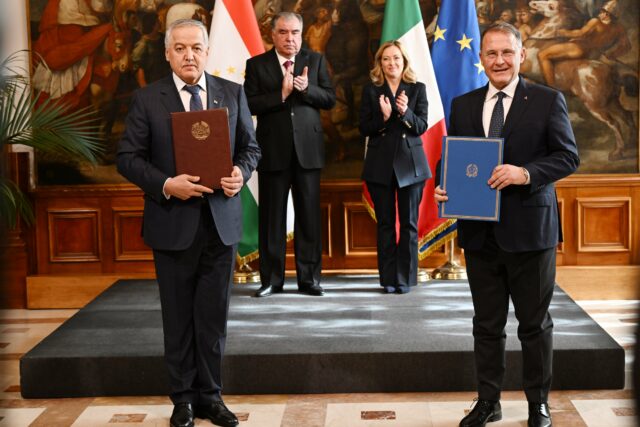
Geopolitical Report ISSN 2785-2598 Volume 41 Issue 23
SpecialEurasia OSINT Unit
Executive Summary
President Emomali Rahmon’s recent official visit to Italy signifies a significant step forward in Tajikistan’s diplomatic relations, underlining the nation’s strategic engagement with Italy across various domains, including political, economic, trade, cultural, humanitarian, and security spheres.
During the visit, both parties signed several agreements aimed at enhancing cooperation in areas such as security, tourism, cultural exchange, and sustainable development.
However, Dushanbe faces persistent challenges, particularly in the Gorno-Badakhshan Autonomous Region (GBAO), where internal tensions and external interests intersect, posing risks to the nation’s stability and security.
Tajik President’s Visit to Italy: Background Information
On April 23rd, 2024, President Emomali Rahmon’s inaugural official visit to Italy marks a significant milestone for Tajikistan’s diplomatic relations. In a series of meetings with Italian counterparts, including Prime Minister Giorgia Meloni and Italian President Sergio Mattarella, the Tajik President addressed a wide range of bilateral interests spanning political, economic, trade, cultural, humanitarian, and security domains.
The visit underscores Tajikistan’s strategic engagement with Italy, reflecting a commitment to strengthen diplomatic ties and foster mutual understanding. By engaging in high-level discussions on various facets of bilateral relations, both parties aim to identify opportunities for collaboration and address potential areas of concern.
Because of the meeting between Rahmon and Meloni, the parties signed a Security Cooperation Agreement, Memorandum of Operational Cooperation in the Fight against Drugs, Memorandum of Cooperation in Tourism, a Program of cultural, scientific and technological cooperation for 2024-2027, Memorandum of cooperation in sustainable development, an Agreement to abolish visa requirements for holders of diplomatic passports, and a Cooperation program between the ministries of the two countries for 2024-2026.
Tajikistan: Risk Scenario
Tajikistan’s geopolitical positioning within Central Asia demands scrutiny amidst the region’s intricate dynamics. The country’s initiatives, including those aimed at achieving energy independence and improving public transportation, align with its broader goals. Notably, emphasis on agriculture not only bolsters food security but also signifies efforts towards economic diversification.
Tajikistan faces persistent challenges such as terrorism, extremism, and cybercrime, necessitating sustained vigilance to safeguard its interests.
The ongoing socio-economic development projects hold promise for elevating the Central Asian republic’s international standing, but internal challenges persist, particularly in the administration of the Gorno-Badakhshan Autonomous Region (GBAO) and the facing of the terrorism threat.
Geopolitically, Gorno-Badakhshan occupies a pivotal position in eastern Tajikistan, sharing borders with Afghanistan, Kyrgyzstan, Xinjiang Uygur Autonomous Region (XUAR), and other Tajik regions. The region’s abundance of resources, including minerals, water, and natural gas, attracts global and regional attention.
China’s infrastructure investment in GBAO, exemplified by the Dushanbe-Kulma highway, and its planned military base reinforce its strategic interests, while Russia asserts influence through the Collective Security Treaty Organization (CSTO), maintaining a strategic presence.
Recent geopolitical shifts, such as the U.S. troop withdrawal from Afghanistan and the Taliban’s resurgence, amplify regional risks. Dushanbe’s security concerns are amplified because of the potential terrorist use of Afghanistan’s terrain, as seen with the Islamic State Wilayat Khurasan (ISKP).
Despite positive economic strides, Tajikistan remains heavily influenced by Russia and China, prompting the need to diversify commercial and political partnerships to reduce dependence on Moscow and Beijing. Enhancing collaboration with the European Union, therefore Italy, and the United States requires navigating criticism regarding GBAO, alleviating pressures from Russia and China.
Discontent among Tajikistan’s populace, exacerbated by the current socioeconomic situation and Western sanctions on Russia, poses challenges to political stability.
While Emomali Rahmon’s leadership has effectively curtailed political opposition, disillusionment among the younger generation could provide fertile ground for jihadist propaganda, especially given terrorist groups in neighbouring Afghanistan.
Conclusion
Italy’s concerted efforts to expand commercial and diplomatic ties with Central Asia signal a strategic move towards diversification. Prioritising cultural cooperation underscores the Italian government’s commitment to strengthening regional relationships and leveraging Central Asia’s abundant natural resources to attract foreign direct investments (FDIs).
This aligns with the European Union’s strategy in the region, presenting an opportunity for Italy to contribute to diversification efforts and reduce reliance on Russia and China.
Italy’s strategic position in the Mediterranean places it as a potential gateway to the Eurasian market. Using its experience in specific sectors, Italy aims to diversify its trade exchange and economic strategy, particularly by exploring new frontier markets in Eurasia.
Amidst recent initiatives from other European Union members such as France, Germany, and the United Kingdom, Italy seeks to carve out its space in the Central Asian market, given the region’s richness of natural resources and its pivotal role in Eurasian interconnection.
A notable Italian presence in Tajikistan and Central Asia supports the European Union’s resilience, prosperity, and regional cooperation agenda in the region. However, challenges such as the Ukraine conflict, Western sanctions on Russia, and security threats from jihadist propaganda underscore the need for careful consideration by Italian authorities.
Read also | Tajikistan’s 2023 in Review Between Government’s Optimism and the Country’s Challenges |
For further information, reports, and risk assessments about Tajikistan, contact us at info@specialeurasia.com



